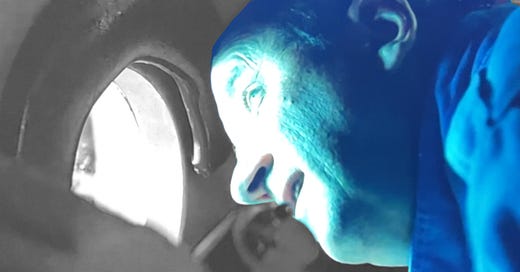A Mistaken Goal
There’s an all-too common mistake first-time screenwriters make when they’re writing their movie.
They’ve probably read just enough screenwriting books or seen just enough how-to videos to figure out the main thing their protagonist needs: a strong goal that will motivate the character to go on an entertaining journey.
And more often than you’d think, that goal, in first-time screenwriters’ screenplays, is financial:
• They have to earn $1000 by Friday in order to cover the rent
• They have a chance to inherit a million dollars from a dying aunt
• They’re vying for a promotion at work to get a big raise
It Doesn’t Work
Making a lot of money might be a powerful motivating force in real life, but it’s DOA in a movie. Movie audiences need to be stirred emotionally—not financially—for a movie to work its magic.
A protagonist who’s only interested in money will turn off audiences (or readers of a script) immediately. We just don’t care about a money-hungry protagonist.
The Movie that Teaches You How to Do It
James Cameron made a handy three-hour lesson to hit this idea home. (Spoilers ahead.)
If you saw Titanic, you probably remember the Romeo and Juliet-inspired love story between Jack (Leonardo DiCaprio) and Rose (Kate Winslet) set against the tragic sinking of the Titanic in 1912.
You might also remember the heart-wrenching climactic scene when Jack freezes to death in the North Atlantic and disappears to the bottom of the ocean as Rose cries and promises to never let go.
This relationship was the heart of the movie. To be together was the goal of the two main characters.
Titanic became the highest-grossing movie of all time, earning over $2 billion.
An Alternate Story
What you might not remember is that the movie begins as an expensive search for a multi-million-dollar diamond necklace, the “Heart of the Ocean.”
A professional treasure hunter (Bill Paxton) takes a present-day submersible to the impossible depths of the sunken Titanic to crack open a safe believed to house the diamond. If he finds it, he’ll share the proceeds with his wealthy financier.
As the movie begins, the treasure hunter is the main character, and finding this diamond is his goal.
When he learns of the existence of Rose, a Titanic survivor who’s still alive and knows about the diamond, he immediately sends for her so she can tell him the story—all for the purpose of finding the treasure.
As the movie unfolds, Cameron shows us how Rose, on the Titanic in 1912, rejects her miserable life as a point-one-percenter to be with Jack, a lowly steerage passenger. Cameron mocks the wealthy passengers and all their pomp and hubris. He reduces them to rats dying on a sinking ship.
He literally pivots us out of the uninspiring story of a man’s search for a valuable diamond, revealing this story is merely a bookend to a much better, much more stirring and emotional story.
He reveals that Rose kept the diamond all these years. Instead of delivering it to the treasure hunter (possibly for a cut of the profits), she secretly tosses it into the North Atlantic so it can be with Jack. Yes, the diamond is worth untold millions of dollars, but its far greater value is as a symbol of her undying love for a poor boy.
Cameron, arguably the world’s most successful filmmaker, is screaming at future screenwriters: “Money doesn’t matter to audiences. They want to feel something, they want human connection. If you want to inspire, show how love conquers greed.”
Are There Exceptions?
Are there popular movies where the protagonist’s goal is to make money? Absolutely.
But in almost every case, the characters are antiheroes. Their love of money destroys them in the end. (The Wolf of Wall Street, The Treasure of the Sierra Madre, The Social Network.)
Or the pursuit of money is a superficial goal, masking a deeper, emotional goal underneath:
• In The Blues Brothers, Jake and Elwood Blues want to get their band back together to raise $5,000. But it’s just a surface goal. Their real goal—the goal beneath the goal—is emotional: they need to pay a tax bill to save the orphanage where they grew up so the kids and beloved janitor, (Cab Calloway), aren’t tossed in the street.
• In Oceans Eleven, Danny Ocean (George Clooney) wants to pull off the biggest heist in Las Vegas. His real goal—the goal beneath the goal—is emotional: he needs to win back his ex-wife, who married a casino owner.
• In The Sting, Hooker and Gondorff (Robert Redford and Paul Newman) want to con a mob boss out of millions of dollars. Their real goal—the goal beneath the goal—is emotional: they need to avenge the murder of their friend and mentor, Luther Coleman (Robert Earl Jones).
• In Jerry Maguire, sports agent Maquire (Tom Cruise) wants to build a successful business. His only client, football player Rod Tidwell (Cuba Gooding Jr.) commands him to “show me the money.” His real goal—the goal beneath the goal—is emotional: to find loyalty and genuine human connection by falling in love with his new firm’s only employee (Renee Zellweger). (In the 90s, no one seemed to think it was a bad idea for a boss to fall in love with his only employee. The movie grossed $273.6 million).
The Clear Lesson
Make it emotional. And why stop there? Make it sappy. Audiences will love you for it.






Great post Scott. Even though it sounds like I need to watch Titanic again
Titanic has a special place in my heart. Not because of any story element in particular, but because I saw it in theater with my middle school girlfriend and we made out the whole time.
Best three hours of tonsil hockey.